Execution of village mayor becomes symbol of Russian brutality in Ukraine
Olha Sukhenko took care of her village like a family for more than a decade before locals found her lifeless body, hands bound, in a shallow grave next to her husband and son.
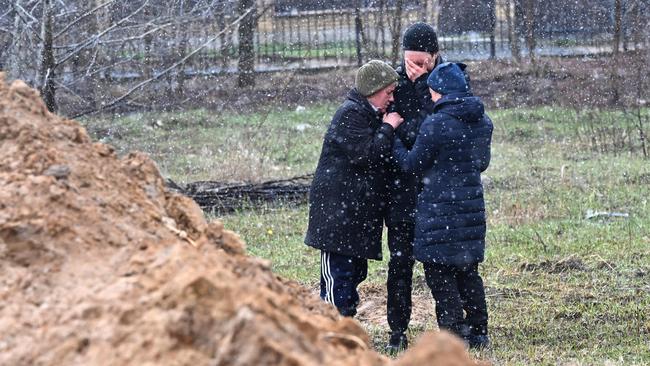
Motyzhyn Mayor Olha Sukhenko took care of her village like a family for more than a decade, locals say, sprucing up public buildings, organising concerts and settling disputes.
When the Russian army withdrew last week after a monthlong occupation, her neighbours found Ms. Sukhenko’s lifeless body in a shallow grave, her hands bound. Her husband and son lay next to her, dead.
Olha, Ihor and Oleksandr Sukhenko are but three of the faces of the brutal aftermath of Russia’s occupation that Ukrainian officials and villagers say left civilians dead on the street and buried under thin layers of dirt before fierce resistance drove them out.
The 50-year-old mayor held together her central Ukrainian village, cut off and near the fighting at the front. She delivered food and medicine. And she helped the resistance, part of an undercover effort to send Russian troop positions and movements to her country’s military, Ukrainian officials and others involved say.
“She was the best person until her last minute,” said Mykola Kurach, the head of the village’s volunteer defence forces who led the reconnaissance effort.
Residents say the Russian aggression against locals surged as the Russians came under attacks from Ukrainian artillery and ambush teams. The Russians shot two women while hunting for Ukrainian agents, they say. The body of another man, a security guard from the local cottage compound, was found dumped down a well.
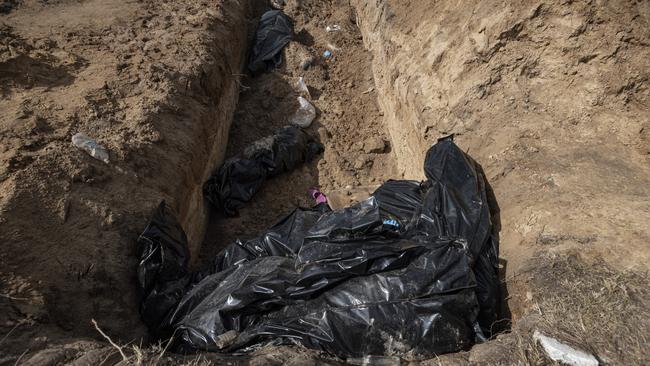
“Those are my relatives in that pit,” said Ihor Radchenko, the Sukhenkos’ son-in-law, crouched nearby as local men began to dig the mayor’s family out on Monday. “Why were they killed? Because they were Ukrainians.” The war came quickly to Motyzhyn, a village of some 1,000 people just off the main highway about 25 miles west of Kyiv. On Feb. 27, three days after Russia invaded, more than 100 Russian army vehicles swept through the quiet, single-lane streets.
“There are foreign bastards in our village,” Ms. Sukhenko posted on her Facebook page on the day they arrived. “Take care. Don’t leave your homes. Keep calm.” The Russians set up a headquarters at a farm on the northeast edge of the village, digging trenches in the nearby forest where locals hunt for wild mushrooms.
Tetiana Semenova, a friend of Ms. Sukhenko who used to be mayor of the next village, urged her to leave.
“How can I leave people?” she recalls Ms. Sukhenko responding. In Ukraine, the head of a village is “psychologist, police, priest, and many more things besides,” said Ms. Semenova, now deputy head of the Kyiv regional council. From her small office in the village council, Ms. Sukhenko would sit on her leather chair with a crocheted seat cover, flanked by a map of the village and a flag of Ukraine, adjudicating disputes such as the boundaries of vegetable plots.
Ms Sukhenko made Motyzhyn “like a flower: pretty, cared for, clean,” said Ms. Semenova. She had the culture centre and kindergarten renovated. Every year she put on a concert to celebrate the oldest and youngest in the village, to thank military veterans, and to hand out awards for the best-looking street and building.
Ms Semenova recalls her friend’s passion for her village at a youth soccer match 15 years ago when she ran up and down the side of the pitch, turning red as she cheered on the village team and throwing her hands in the air when her son, Oleksandr, scored a goal.
“She did everything from the heart,” said Ms. Semenova.
At the start of the war, the population of the village swelled by thousands as many Kyiv residents thought they would be safer in the countryside than the capital. During the Russian occupation with dwindling supplies, many say they relied on food and medication brought personally by Ms. Sukhenko or family members. She arranged deliveries from unoccupied areas and took milk to children in a nearby village. At the start of March, she organised a convoy of civilians to evacuate the town.
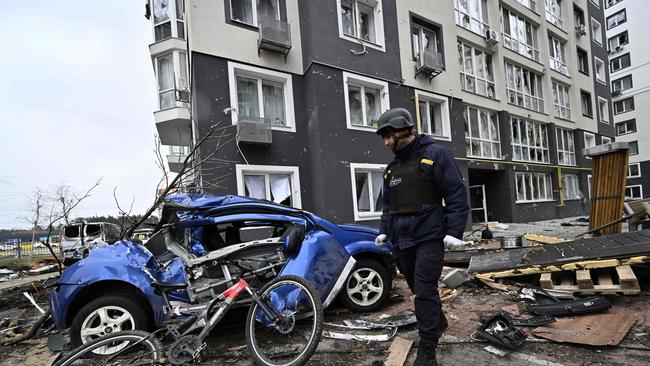
Ms Sukhenko also took on a riskier role: helping pass information on Russian troop locations and movements to the Ukrainian army.
Mr. Kurach, the 43-year-old head of the village’s volunteer defence force, moved in with the Sukhenkos after his house was damaged by shelling. He and Ms. Sukhenko’s husband, Ihor, would head out on scouting missions or “go to work,” as they called it. They and Ms. Sukhenko shared the information with Ukrainian forces via cellphone messages, according Mr. Kurach. Ukrainian army scouts visited the house for updates.
“It is dangerous for everyone, but someone needs to do it,” said Mr. Kurach. The Russians had dug in on the edge of town in the forest with a network of trenches. Commanders were based in a small farm building nearby, according to local residents, with sacks hung over the windows to block light from getting out and giving away a target. The farm is now strewn with jars of borscht, empty alcohol bottles and juice cartons, and a book in Russian about Nostradamus.
“They were planning to be here for some time,” said Ivan Rudyak, the commander of the territorial-defence unit in a nearby village who is in charge of restoring order in Motyzhyn.
But the assault on Kyiv wasn’t going well. An initial lightning thrust had been repelled. Ukrainian forces had blown bridges and were preventing them from crossing. Attempts to surround the city were proving difficult. One attempt by Russian armoured vehicles to break south of Motyzhyn failed, with at least one tank destroyed. Ukrainian artillery shelled Russian positions in the forest on the edge of Motyzhyn.
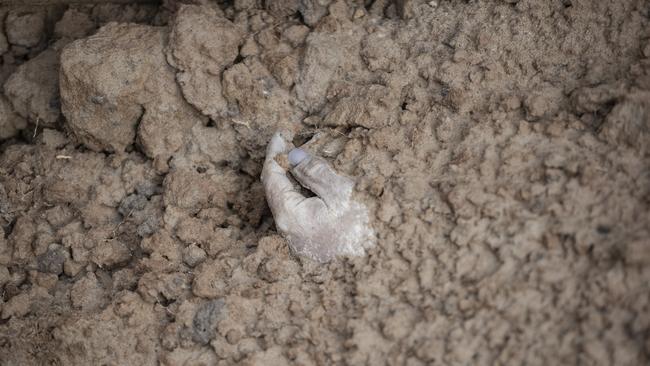
On March 18, a Ukrainian ambush team sneaked into the village and destroyed a Russian armoured vehicle and truck with antitank weapons. The Russians responded with fury. The next day, they launched what they called a clearance operation through the village in search of Ukrainian agents.
Alla Loboda, a 67-year-old resident, was standing outside her front gate just after midday when a Russian armoured vehicle flanked by troops with rifles appeared on her street, firing seemingly at random. Neighbours, Alina Sukhenko and her husband, saw her running toward their gate before they hid behind their house. The Russians entered their yard and fired at their car, but left after finding no one there.
The Sukhenkos, distant relatives of the mayor, crept out and saw Ms. Loboda face down by the side of the road, shot through the chest.
Neighbours buried her in her front yard, marking the grave with a wooden cross and a traditional Ukrainian embroidered cloth.
“She was such an elegant lady,” said Alina Sukhenko.
A 42-year-old villager called Yaroslava Litvynenko and her father, Mykola, ran across their yard as the Russians approached. Ms Litvynenko fell behind, then collapsed to the ground, shot through the chest. The Russians crashed through a fence in an armoured vehicle.
“Why were you running?” her father recalled them yelling.
“Why were you shooting?” he countered.
The Russians loaded her into the armoured vehicle and took her to their encampment where they tried to save her. She died, and they dug a grave for her, marking it with a wooden cross and a piece of paper with her name on.
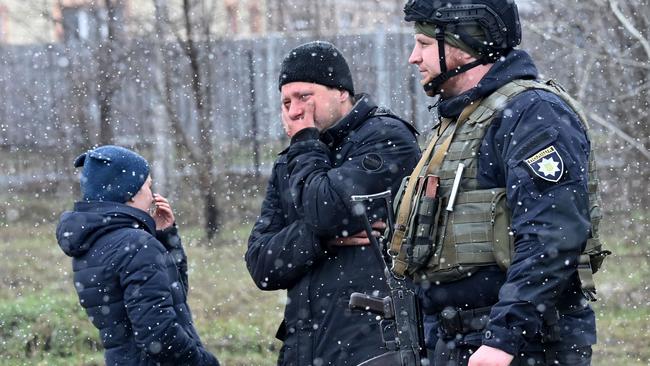
Fearful locals hung white flags and wrote “children” on their fences. The Russians were also closing in on the intelligence operation. Mr. Kurach’s neighbours spotted drones flying over his house. Russian soldiers came and asked where he was.
In the morning on March 23, Ihor Sukhenko, the mayor’s husband, told Mr. Kurach that it was getting too dangerous and that he should leave with his wife and son. Mr. Kurach at first refused, as Ms. Sukhenko said her family would stay. So Mr. Sukhenko turned on the motor of the family car and ordered Mr. Kurach to load his family in and get out.
Minutes later, around midday, the Russians came to the mayor’s house searching for Mr. Kurach. They took Oleksandr Sukhenko’s silver sedan, painting a V on the side, a mark identifying Russian forces.
Ms Sukhenko called Mr. Kurach’s wife and told her they should run because the Russians were looking for them. By then, the Kurachs were already out of the village on a back road.
The Russian soldiers returned an hour later and took away the mayor and her husband and told Oleksandr that they would bring them back soon. Oleksandr called Mr. Kurach and warned him to destroy his SIM card to prevent the Russians finding and identifying him. In the evening, the Russian soldiers returned and took away Oleksandr.
At the end of March, the Ukrainian army smashed their way into the village to find most of the Russian forces already gone. The Russians appear to have packed up quickly, leaving fatigues and boots at the farm and in the trenches.
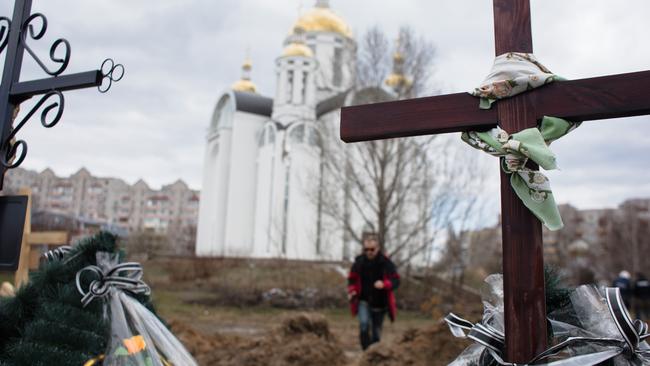
There were civilian bodies in the streets and in cars when they arrived, said Mr. Rudyak, the territorial-defence commander who is temporarily in charge of the village.
Some Ukrainian soldiers found the Sukhenkos’ bodies in a shallow grave in the woods, their hands bound and bodies partially visible — a hasty burial. The soldiers scraped back some of the earth and untied their hands.
A fourth person in the grave was an army scout not from the village, residents and police said.
On Monday, police forensic teams arrived to investigate along with a team of men to dig out the bodies.
They hauled the man up who was slumped at the bottom of a well with a bruised and lacerated face and upper body.
Next they dug out Ms. Litvynenko’s body from the nearby grave. Her father glanced into the hole as four men pulled her out.
“Yes,” he said. “It’s her.” The village is mourning its loss. Alina Sukhenko, who grew up in Motyzhyn, recalled her grandmother saying the Nazis only killed one person when they were in the village.
The Russians “looked for the strongest people,” said Ms. Semenova, Ms. Sukhenko’s friend. “Olha was a locomotive who pulled everyone else behind her.” “If there is no locomotive, they think we will be slaves like in Russia, ” she said. “But we will never be slaves.” —Oksana Grytsenko contributed to this article.
The Wall Street Journal
